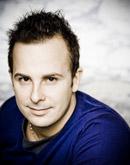by Steve Cohen
 Yannick
Nézet-Séguin, who conducts the new Carmen at the Met, is still
a relatively unknown name to casual attendees. I even had to spell his
name twice before the desk clerk at his Manhattan hotel knew to whom
I was referring. After the broadcast, telecast and HD movie screening
of that production, he's certain to lose such anonymity.
Yannick
Nézet-Séguin, who conducts the new Carmen at the Met, is still
a relatively unknown name to casual attendees. I even had to spell his
name twice before the desk clerk at his Manhattan hotel knew to whom
I was referring. After the broadcast, telecast and HD movie screening
of that production, he's certain to lose such anonymity.
His background was singing in choruses, and his first professional job was as a chorus master in Montreal. He led oratorios and, gradually, eased into opera. Over the next seven years he conducted many operas before he launched an international career with symphony orchestras around 2004, when he was 29.
Nézet-Séguin was born in Montreal to French Canadian parents. His first name, and the first half of his last name, come from his mother's family which came over from Breton (Brittany.) Her grandfather Nézet was one of the first settlers from Breton to Canada and Yannick was given that name to honor him and perpetuate his heritage. His father's surname, Séguin, is Québécois French. The youthful conductor is short, with brushed up, almost-spiked hair and an outgoing demeanor.
After five years of building a symphonic reputation, the conductor now is trying to avoid being pigeonholed He wants to find a balance. "I think 50-50 is the right mix," he says. "Symphony orchestras should program operas too, because it gives them a new range, and it gives orchestra and conductor the opportunity to breathe and to accompany."
He wants to find a balance within his opera repertoire as well. For example, after Romeo et Juliette and Carmen, Nézet-Séguin wants to show "that I'm not only a French opera conductor."
Upcoming is Turandot in the Netherlands, Don Giovanni at Salzburg (as well as a repeat of his successful Romeo et Juliette there,) and then Salome in Montreal. He is engaged to return to the Metropolitan but cannot disclose what operas. The Met will announce its 2010-11 season in February. He also will conduct at La Scala and Covent Garden.
His wish list includes Verdi, especially Don Carlo. You will note that I use the Italian name rather than the French Don Carlos. Nézet-Séguin says he'd love to do the original French but hardly anyone is prepared to stage that.
Speaking with me after five weeks of rehearsing Carmen at the Met, and two days before the production's premiere, Nézet-Séguin says it's been a pleasure to explore the piece so thoroughly. "The Met orchestra, of course, does not need rehearsing but we developed new textures, a slightly different sound, crisp, clear and immediate and with a hint of what eventually would come to be the impressionist style of Debussy and Ravel."
"This may be the best-sung Carmen ever," he enthuses. "Elina Garanca is vocally perfect for Carmen and it's difficult to match Roberto Alagna for his combination of power, French style, and a threatening quality. It's important that the Don Jose has just as strong an appeal to the audience as the Carmen. They must match each other in strength."
Meanwhile, Nézet-Séguin keeps up a full schedule in concert halls. He is chief conductor of orchestras in Montreal, Rotterdam and London and just finished a week as guest conductor of the Philadelphia Orchestra. Last year he led the Philadelphians in Rachmaninov and Tchaikovsky - "difficult for a debut because that orchestra is famous for that music, but it turned into a great meeting point." This December he led pieces by the French-Canadian Vivier, Brahms and Franck's Symphony - "a very delicate work with an unusual cross of Germanic style and French colors." This critic feels it received the best-conceived and most beautiful rendition in memory.
He'll return to Philadelphia in a Germanic program next year, and those concerts might confirm the feeling of some Philadelphia patrons that Nézet-Séguin should be considered as music director. Without discussing that specific, Nézet-Séguin says he found the Philadelphia Orchestra players to be "extremely professional and ready, of course, and also enjoyably dedicated to making music."